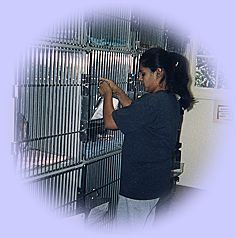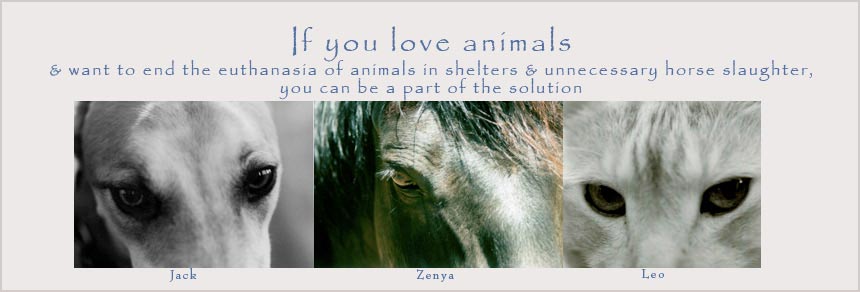Message
Compassion Fatigue of Animal Care Work
What's the Difference Between Coping and Healing?
Case Studies and Creating an Action Plan for Yourself
Coping is about resiliency--keeping up our ability to manage stress day to day. It's about the necessary need for finding ways to escape the pressures of stress, and about needed short term rejuvenation.
Healing is about preventing and alleviating the root causes of our stress for long term change. It's about figuring out what causes it and committing to either trying to change it, accept it, or leaving it. Healing is about our deepest levels of learning, growth and awareness.

Coping and Healing are both needed to help with compassion fatigue. Coping is what we do when we take a much needed coffee break after a particularly difficult exchange with a boss, or member of the public. Healing is what we do when we take the time to stop to really think about "why do I react that way with this person?" "How can I think about this situation differently, how can I frame it, how can I perhaps respond differently so it doesn't always rile me up so horribly?" "How can I change it for the long run?"Healing is when we want to truly change the situation or our reaction to it, not merely escape the pain and tension it brings.
And, escape from tension is also necessary! Joseph Campbell, the famous mythologist, calls it a need for having a "bliss station." We do need places to go and things to do to bring us relief from the stress and pain of this work. Imagine the cycle of stress represented as a circle. Along this circle there are events or situations which trigger our negative reactions (pain, heartache, frustration, anger, etc.). Coping is what we do to live through those events or periods of time. Healing is what we do to literally remove those events from our lives, or when we shift our thoughts and feelings about the issues so deeply that when the events occur, they no longer trigger such unpleasant reactions. In our own stress cycles of life, if all we do is cope, we're really just taking breaths in between bouts of stressful events. In the highly stressful environment of animal welfare work, coping without deeper healing will burn us out. Coping and healing are very important.
Take a look at the following list of differences and examples of coping and healing. Where do you see yourself? What strategies might you want to add to your own repertoire of coping and healing skills?
Differences Between Coping and Healing
|
COPING |
HEALING |
|
Builds resiliency to buffer the cycles of stress |
Breaks the cycle of stress |
|
Band-aides |
Solves problems |
|
Maintains status quo |
Creates state of wholeness |
|
What we do to get by, survive stressful issues |
What we do to resolve, come to terms with stressful issues (at least our reactions to them) |
|
Helps reduce tension |
Replaces tension with acceptance and serenity |
|
Express feelings simply to vent |
Express feelings with intent to understand them, process them, let them go & move on |
|
Find ways to escape overwhelming emotions so can continue life without disruption |
Aware of emotions and work to resolve them |
|
Temporary measures |
Long lasting measures |
|
Alleviates symptoms |
Alleviates root causes |
|
Helps to escape stress |
Requires us to fully face issues surrounding stress |
|
Can be light and fun |
Can be intense |
|
Can be quick, immediate |
Takes more time & consideration |
Examples of Coping and Healing
|
COPING |
HEALING |
|
Sharing feelings in a support group. |
Sharing feelings in a support group |
|
Sharing feelings and stories with co-workers, friends or family |
Sharing feelings and stories with co-workers, friends or family with intent to understand them |
|
Taking time to relax--either favorite leisure activities or relaxation exercises |
Relaxation or meditation to help come to terms with the stress and heal any pain |
|
Pray--use spiritual beliefs and practices for support to get by an endure |
Pray--use spiritual beliefs and practices for support to get by and endure, but also for guidance to truly learn and courage to change if necessary |
|
Get aways! A few hours or long vacation to simply escape tension and responsibility |
Use some time of the getaway for reflection, to come back to center. . . |
|
Listen to music for pure enjoyment |
Choose music to intentionally match your mood to legitimize your feelings and allow full emotional expression |
|
Enjoy beautiful art |
Express your feelings through drawing, painting, collage, or any form of artistic expression. Look for and reflect on messages from your heart. |
|
Write in a journal |
Reflect on what you write in your journal, see the patterns, learn and grow from it |
|
Spend time in nature |
Be aware of and allow the magic of nature to soothe and heal you |
|
Spend time with human and animal loved ones |
Spend quality time with them, building reciprocity of love, caring and support |
|
Moving from department to department, from job to job when can't get along with someone. Blaming almost all problems on others. |
When having problems with boss or others, really think seriously about why, what do I contribute to problem, what does other contribute? What does other contribute? Work to make relationship constructive. When that doesn't work, then initiate transfers to new jobs, learn from what didn't work. |
Action Plan for YOUR Stress
|
In regard to your pressures and stress... 1. What are you doing to COPE? (i.e. to get by, survive...) |
|
2. What are you doing to HEAL? (i.e. to resolve stress, come to terms...) |
|
3. What is one additional thing you can begin to do (or do more of!) to strengthen your own prevention and healing of compassion fatigue? |
COPYRIGHT AND AUTHORSHIP NOTICE: The information contained in this Compassion Fatigue section of my site was originally written in 1994, has been updated several times and has been copyrighted since its inception. In July 2015, Judy Scheffel used the material on these pages as if it was her own, violating copyright law and a written agreement to use it only with attribution, for a webinar organized by Lisa Levinson and sponsored by In Defense of Animals. A video of the webinar, in which Scheffel plagiarized thousands of words from this site and deceptively presented the models in these pages as if they were her own original concepts, appeared on the In Defense of Animals web site and on YouTube until August 20, 2016.
If you participated in this webinar or viewed it on YouTube, please be advised that authorship of approximately 80% of the webinar content includes material copyrighted by Teresa Wagner and was used fraudulently by Judy Scheffel.


